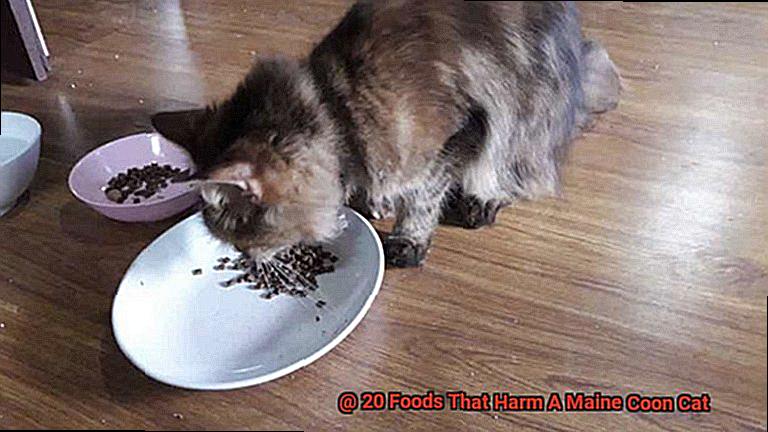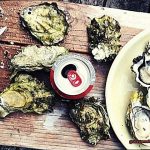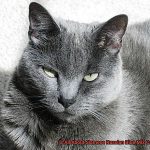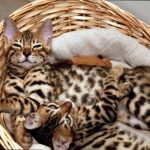We all know that Maine Coon cats are a special breed, with their majestic appearance and loving personalities. But did you know that they also have unique dietary needs?
As much as we want to spoil our furry friends with treats, it’s important to be aware of what foods can actually harm them. That’s why today, we’re delving into the top 20 foods that can be dangerous for our beloved Coonies.
So grab your favorite beverage and let’s explore the world of cat nutrition together.
20 Foods That Harm A Maine Coon Cat?
Contents
As a Maine Coon cat owner, you probably already know that these majestic felines have specific dietary needs. Their large size and gentle nature make them stand out among other cat breeds, but it also means that their digestive systems can be sensitive to certain foods. As a responsible pet parent, it is crucial to be aware of the potential dangers that certain foods can pose to your beloved Maine Coon.
While some foods may seem harmless, even small amounts can have serious consequences for your cat’s health. Here are 20 foods that you should avoid feeding your Maine Coon:
Onions and Garlic
These common cooking ingredients contain a compound called thiosulphate which can damage a cat’s red blood cells, leading to anemia.
Grapes and Raisins
These fruits may seem like healthy snacks, but they can cause kidney failure in cats.
Chocolate
This sweet treat contains theobromine which is toxic to cats, causing vomiting, diarrhea, and even seizures.
Alcohol
Just like humans, cats can also suffer from alcohol poisoning which can lead to liver damage and even death.
Xylitol
This sugar substitute is often found in sugar-free gum and other products and can cause a rapid release of insulin in cats, leading to hypoglycemia (low blood sugar) and liver failure.
Caffeine
Whether in the form of coffee or energy drinks, caffeine can be fatal for cats if ingested in large amounts.
Avocados
This trendy fruit contains a substance called persin, which can cause vomiting and diarrhea in cats.
Macadamia Nuts
These nuts can cause muscle tremors, weakness, and hyperthermia (increased body temperature) in cats.
Raw Dough
The yeast in raw dough can ferment in a cat’s stomach, leading to gas and bloating, and in severe cases, alcohol poisoning.
Milk and Dairy Products
While cats love milk, most are lactose intolerant and can suffer from digestive issues if they consume dairy products.
Bones
While raw bones can be beneficial for cats’ dental health, cooked bones can splinter and cause serious internal damage.
Tuna
While a small amount of tuna is okay, too much can lead to mercury poisoning in cats.
Dairy products to avoid: The dangers of milk, cheese, and ice cream for Maine Coons
While dairy may be a staple in our diets, it can be harmful to our fluffy friends. In this section, I will dive deeper into the dangers of dairy for Maine Coons and provide alternative options for their diet.
Maine Coons are known for their large size and gentle nature, but they also have specific dietary needs that must be met to maintain their health and well-being. One of the main issues with dairy products for these felines is that they are lactose intolerant. This means that their bodies cannot properly digest lactose, the sugar found in milk and other dairy products.
So what happens when a Maine Coon consumes dairy? Well, it can lead to some unpleasant digestive issues such as diarrhea, vomiting, and abdominal pain. And let’s face it, no one wants to clean up that mess. In severe cases, it can even lead to dehydration and malnutrition if your cat is unable to keep any food down.
But wait, there’s more. Not only are dairy products hard for Maine Coons to digest, but they also lack essential nutrients that these cats need in their diet. Milk, one of the most common dairy products given to cats, contains high amounts of lactose and lacks important vitamins and minerals. Cheese and ice cream may be tempting treats for your furry friend, but they are also high in lactose and fat which can wreak havoc on their sensitive digestive systems.
So what’s a Maine Coon owner to do? Instead of dairy, it is crucial to provide your gentle giant with a balanced and nutritious diet that meets their specific needs. This can include high-quality cat food specifically designed for Maine Coons or a raw diet approved by your veterinarian. These options provide all the necessary nutrients without the risk of digestive issues.
It is also important to note that not all cats are lactose intolerant, but it is always best to err on the side of caution when it comes to their health. Some cats may tolerate small amounts of dairy, but it is always best to consult with your veterinarian before introducing any new foods into your Maine Coon’s diet.
Tuna: A popular treat that can be toxic to Maine Coon cats due to high levels of mercury
As cat owners, we all want to give our furry companions the best care and nutrition possible. And when it comes to treats, tuna is often a go-to choice for many of us. After all, what cat doesn’t love the taste of this delicious fish? However, as an expert on Maine Coon cats, I have come across some alarming research that suggests tuna may not be the best option for our beloved feline friends.
Maine Coon cats, in particular, are at a higher risk of suffering from the harmful effects of tuna due to their large size and sensitivity to mercury. Yes, you read that right – mercury, the toxic metal often associated with polluted water and fish consumption. But how does this affect our Maine Coons?
Firstly, let’s understand why tuna contains high levels of mercury. Tuna is a top predator fish in the ocean, meaning it eats smaller fish that may contain traces of mercury. As it moves up the food chain, the mercury accumulates in its body. And since Maine Coon cats have a longer lifespan than most other cat breeds, they have more time to accumulate toxins in their bodies, making them more susceptible to mercury poisoning.
So what are the potential risks of feeding tuna to Maine Coon cats? Well, for starters, the symptoms of mercury poisoning in cats can range from vomiting and diarrhea to loss of appetite, lethargy, and even neurological issues. These symptoms can easily be mistaken for other common ailments in cats, making it difficult for owners to identify the cause of their pet’s illness.
But don’t worry; there are ways to prevent such risks and still give your Maine Coon a tasty treat. Firstly, limit the amount of tuna you give to your cat and opt for low-mercury options such as skipjack or canned light tuna. These options have lower levels of mercury compared to other types of tuna. Additionally, avoid giving tuna to pregnant or nursing Maine Coon cats, as the mercury can pass through the placenta or breastmilk and harm the kittens.
In the event that your Maine Coon does show signs of mercury poisoning, it is crucial to seek immediate veterinary care to prevent further complications. Remember, the health and well-being of our pets should always be our top priority.
The harmful effects of onions and garlic on a Maine Coon’s red blood cells
The Maine Coon is a majestic and beloved breed known for their large size and gentle, playful nature. As a Maine Coon owner, you want to do everything in your power to keep your furry friend healthy and happy. This includes being aware of potential dangers in their diet, such as onions and garlic.
While these ingredients may seem innocent to us humans, they can have harmful effects on a Maine Coon’s red blood cells. Onions and garlic contain a compound called thiosulphate that can cause Heinz body anemia in cats. This condition can be fatal if not treated promptly and can cause symptoms such as weakness, lethargy, and pale gums.
Maine Coons are particularly susceptible to this condition due to their larger size and higher red blood cell count compared to other breeds. This means that even a small amount of onion or garlic can have a significant impact on their health.
But it’s not just Heinz body anemia that Maine Coons need to worry about when it comes to onions and garlic. The compound in these ingredients can also cause oxidative damage to a cat’s cells, leading to organ damage and potential long-term health issues.
As responsible pet owners, it is important for us to be aware of the potential harm that onions and garlic can cause our beloved Maine Coons. This means avoiding feeding them any foods that may contain these ingredients, including baby food, canned soups, and some commercial pet treats.
If your Maine Coon accidentally consumes onions or garlic, it is crucial to seek immediate veterinary care. Treatment may include inducing vomiting and providing supportive care to help the cat’s body eliminate the harmful compounds. In severe cases, blood transfusions may be necessary to treat anemia caused by onion or garlic ingestion.
To prevent any accidents from happening, always check ingredient labels and avoid feeding any food that may contain onions or garlic to your Maine Coon. Instead, opt for cat-safe alternatives such as cooked plain chicken or fish as treats.
Surprising culprits: Grapes and raisins as potential causes of kidney failure in Maine Coons
As a Maine Coon owner, you may already know about the risks of onions and garlic for your feline friend. But did you know that seemingly harmless fruits like grapes and raisins can also pose a serious threat to your cat’s health? Yes, you heard that right. These tiny treats may seem innocent, but they can be surprisingly harmful to our beloved Maine Coons.
You may be wondering, how can something as small as a grape or raisin cause harm to my cat? Well, the answer lies in a toxin found in these fruits that can lead to acute kidney failure in cats. While the exact cause of this toxicity is still unknown, it is believed that the chemicals present in grapes and raisins can damage the kidneys and prevent them from functioning properly.
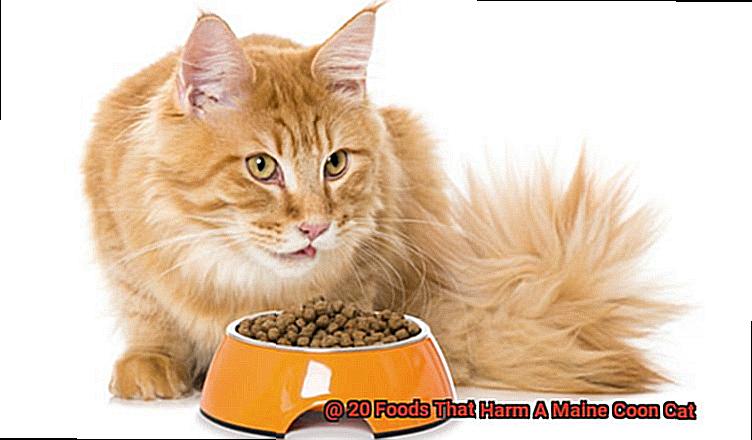
Maine Coons are especially vulnerable to this toxicity due to their larger size and tendency to overeat. Unlike smaller cats, Maine Coons have a higher tolerance for food and may consume more grapes or raisins without showing any immediate symptoms. This makes it difficult for owners to determine when their cat has ingested a toxic amount of these fruits.
The amount of grapes or raisins that can cause harm to a Maine Coon also remains a mystery, making it crucial for owners to keep these foods away from their cats at all times. Even small amounts can have detrimental effects, so it’s better to err on the side of caution and avoid giving your Maine Coon any grapes or raisins.
But what are the signs of grape or raisin toxicity in Maine Coons? Look out for symptoms such as vomiting, diarrhea, lethargy, and decreased appetite. If you notice any of these signs after your cat has ingested grapes or raisins, seek immediate veterinary care. If left untreated, this toxicity can lead to permanent kidney damage or even death.
As with any potential toxin, prevention is key. Keep all grapes and raisins out of reach of your Maine Coon and monitor them closely during gatherings or parties where these foods may be present. It’s also important to educate friends and family about the dangers of grapes and raisins for cats, as they may unknowingly offer these treats to your feline companion.
Theobromine in chocolate: How this ingredient can harm a Maine Coon’s health
Their size can also make them more susceptible to certain health issues, including theobromine poisoning from chocolate. As an expert on the topic, I want to educate you on the potential dangers of theobromine in chocolate and why Maine Coons are particularly sensitive to it.
What is theobromine and how does it affect Maine Coon cats?
Theobromine is a chemical compound found in chocolate that belongs to the same family as caffeine. While humans and some animals can metabolize theobromine efficiently, cats, especially Maine Coons, are not able to do so. This means that even a small amount of chocolate can be harmful to their health.
Why are Maine Coon cats more susceptible?
Maine Coon cats have a larger body mass compared to other breeds, which means they need higher doses of theobromine to experience its effects. This also means that their bodies cannot process and eliminate theobromine as quickly as smaller cats. As a result, even a small amount of chocolate can lead to serious health complications for Maine Coons.
What are the symptoms of theobromine poisoning in Maine Coons?
Symptoms of theobromine poisoning in cats include vomiting, diarrhea, increased heart rate, and seizures. In severe cases, it can lead to heart failure and death. If you notice any of these symptoms in your Maine Coon after they have consumed chocolate, it is important to seek immediate veterinary care.
What types of chocolate should I avoid giving my Maine Coon?
It’s important for Maine Coon owners to understand that all forms of chocolate contain varying levels of theobromine. Dark chocolate contains a higher concentration of this chemical compared to milk chocolate, making it more dangerous for cats. Baking chocolate and cocoa powder also contain high levels of theobromine and should be kept away from your Maine Coon at all times.
Other potential sources of theobromine in your home:
Aside from chocolate, there are other potential sources of theobromine in your home that you may not be aware of. Certain desserts, energy bars, and even some medications may contain this chemical compound. It is important to always read labels and keep these products out of reach from your Maine Coon.
Other foods to avoid: Raw meat, alcohol, caffeinated drinks, and bones for Maine Coons
When it comes to our beloved Maine Coons, we want nothing but the best for them. As cat owners, we strive to provide them with a balanced and nutritious diet to keep them healthy and happy. However, there are certain foods that may seem harmless to us humans but can actually be dangerous for our feline companions. As an expert on the topic, I want to highlight some other foods that should be avoided for Maine Coons.
Raw meat may seem like a natural and healthy choice for cats, but it can actually pose serious health risks. Raw meat can contain harmful bacteria such as E.coli and Salmonella, which can cause digestive issues and even food poisoning in cats. Maine Coons have sensitive digestive systems and are more vulnerable to these bacteria, so it is important to always cook meat thoroughly before feeding it to your feline friend.
Just like humans, alcohol can have negative effects on cats. Even a small amount of alcohol can be toxic for Maine Coons and can cause lethargy, disorientation, and liver damage. As responsible pet owners, we should always keep our cats away from any drinks that contain alcohol.
Caffeine is another common ingredient found in many human foods and drinks that can be harmful to Maine Coons. It can cause restlessness, rapid breathing, heart palpitations, and muscle tremors in cats. Maine Coons are particularly sensitive to caffeine, so it is important to keep them away from coffee, tea, energy drinks, and other caffeinated beverages.
While bones may seem like a natural and healthy treat for cats, they can actually be dangerous for Maine Coons. Cooked bones can splinter and cause internal injuries or blockages in a cat’s digestive system. It is best to avoid giving your Maine Coon any type of bones and stick to safer treat options such as commercial cat treats or cooked meat.
In addition to these specific foods, it is important to remember that a Maine Coon’s diet should primarily consist of high-quality cat food specifically formulated for their breed and age. Any human foods should only be given as occasional treats and should not make up a significant portion of their diet. If you are unsure about whether a certain food is safe for your Maine Coon, it is always best to consult with your veterinarian first.
What to do if your cat consumes any of these harmful foods? Seeking immediate veterinary assistance is crucial.
You may have even researched and carefully chosen the best food for your furry companion. However, there are some foods that can harm your Maine Coon, and it is crucial to understand the potential risks and take immediate action if your cat consumes them.
Maine Coons have a sensitive digestive system, and certain foods can easily upset it. Dairy products such as milk, cheese, and ice cream may seem harmless, but they can cause stomach upset, diarrhea, and vomiting in Maine Coons. This is because these cats are lactose intolerant and cannot digest dairy products properly. So, if you want to treat your cat with a bowl of milk, think again.
Tuna is another popular treat for cats, but it can be harmful to Maine Coons. This fish contains high levels of mercury, which can be toxic to their bodies. Regular consumption of tuna can lead to mercury poisoning in Maine Coons, causing neurological issues and even death. It is best to avoid giving tuna to your cat altogether.
Onions and garlic are common ingredients in many human meals, but they can be dangerous for Maine Coon cats. These foods contain a compound called thiosulphate, which can damage the red blood cells of cats, leading to anemia. If consumed in large quantities, onions and garlic can cause serious health issues in Maine Coons.
Grapes and raisins may seem like healthy treats for cats, but they are on the list of foods that are harmful to Maine Coons. These fruits can cause kidney failure in felines, including Maine Coons. It is best to avoid giving these fruits to your cat altogether.
Chocolate is a well-known food that is toxic to cats. It contains theobromine, which can cause vomiting, diarrhea, seizures, and even death in Maine Coons. It is important for owners to keep all forms of chocolate away from their cats’ reach.
Other foods that can harm Maine Coon cats include raw meat, alcohol, caffeinated drinks, and bones. These can cause digestive issues, choking hazards, and even poisoning in these cats. As a responsible owner, it is crucial to keep these foods away from your cat and seek immediate veterinary assistance if they accidentally consume them.
So why is immediate veterinary assistance crucial in these situations? Time is of the essence when it comes to treating your cat’s health. The longer you wait to seek help, the more severe the consequences can be. Some harmful foods can cause damage to a cat’s digestive system and other organs, leading to worsening symptoms or even death in severe cases.
Conclusion
In conclusion, it is important to carefully consider the food choices for your Maine Coon cat.
Certain foods can be harmful and even toxic to their health. It is crucial to always consult with a veterinarian before making any changes to your cat’s diet.
So, make sure to avoid these 20 foods that can harm your Maine Coon and stick to a balanced and appropriate diet for their specific needs.

